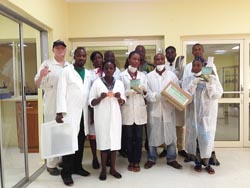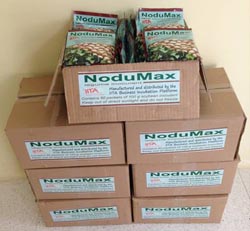IITA and N2Africa are exploring commercial inoculant production through its recently established Business Incubation Platform (BIP). A new building was constructed at the BIP that has ample room to accommodate different inoculant production lines and scales of operation. The factory consists of a warehouse area, a carrier preparation room, a station where broth is prepared and mixed with carrier, a curing room, a product storage room, and a quality control laboratory. The curing room has both controlled temperature and humidity so that the inoculant rhizobia may be better hardened prior to use. Two production approaches are being tested, the standard broth injection procedure and bulk mixing. The current pilot product, NoduMax is a peat-based carrier intended for soybean containing elite Bradyrhizobia. It is packaged in 100 g quantities intended for 10 to 20 kg of soybean seed along with gum arabic and instructions in four languages, English, Hausa, Ibo and Yoruba. Currently only inoculants for soybean are under development, bit additional products, included a granular formulation for groundnut are planned.
 |
Left: The NoduMax factory team at the IITA Business Incubation Platform are developing a commercial production line for legume inoculants in west Africa
Right: NoduMax is being packaged in 100 g sachets with 50 sachets to the box for distribution to agrodealers and soybean producer associations in Nigeria |
 |
Product refinement is underway. Different strains of elite rhizobia for soybean are being evaluated in the greenhouse and field. The imported peat carrier material was originally intended for sterilization by gamma irradiation elsewhere in Nigeria, but that facility is currently not in operation and autoclaving the carrier in 40 kg batches has resulted in mixed success. The production and delivery of rhizobial broth is also under refinement, an initial approach to rearing rhizobia in liquid media under forced aeration has proven difficult to scale up and the use of larger, industrial bio-fermentors is being considered. Early approaches to the packaging suggests that up to 1600 packets with a total value of US $4000 may be produced in one day.
The NoduMax factory at the BIP is not intended to meet all of West Africa’s demand for soybean inoculant, rather it is considered to be a pilot operation where the feasibility of inoculants are demonstrated to the private sector. At best, the NoduMax factory can only provide 10% of the soybean inoculants required by soybean growers in Nigeria alone. The overall strategy of the BIP is "to better link research, product development, commercialization and capacity building through the establishment of pilot production facilities intended for adoption, replication and scale up by the private sector", and NoduMax is performing this function. Once a smooth production line is established, potential investors will be invited to evaluate its operations and profitability and invited to replicate legume inoculant enterprise, relying on the BIP for training and technical backstopping. Look to the Podcaster for more developments on NoduMax in the future.
Paul L. Woomer and Dianda Mahmadi
